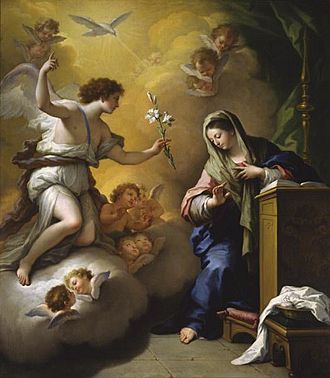Feast of the Annunciation facts for kids
Quick facts for kids Feast of the Annunciation |
|
|---|---|

The Annunciation by Paolo de Matteis.
|
|
| Observed by | Christianity |
| Type | Christianity |
| Date | 25 March |
| Frequency | annual |
| Related to | Christmas Day |
The Feast of the Annunciation is a special day in Christianity. It celebrates the moment when the archangel Gabriel visited the Virgin Mary. Gabriel told Mary that she would become the mother of Jesus Christ, the Son of God.
This important day is celebrated every year on March 25. In the Catholic Church, if March 25 falls during Holy Week or Easter Week, the celebration is moved to a different day. However, in Eastern Orthodoxy and Eastern Catholicism, it is always celebrated on March 25, even if it falls on Easter.
The Feast of the Annunciation is celebrated by most Christians. This includes followers of Orthodoxy, Anglicanism, Catholicism, and Lutheranism. It is a very important day to honor Mary. In the Catholic Church, it is called a "solemnity." In Orthodox Christianity, it is one of the eight "great feasts" because it announces that Jesus Christ would become human.
This event is so important that it is remembered in prayers like the Angelus. It is also the first "Joyful Mystery" in the Rosary.
Contents
The Annunciation Story in the Bible
The story of the Annunciation is found in the Gospel of Luke. In this part of the Bible, the angel Gabriel greets Mary. He says, "Hail, full of grace, the Lord is with thee" (Luke 1:28).
Mary then responds to God's plan for her. She says, "be it done to me according to thy word" (Luke 1:38). This shows her acceptance of God's will.
The angel's greeting to Mary is the start of the Hail Mary prayer. The second part of this prayer comes from the greeting of Saint Elizabeth to Mary during the Visitation.
History of the Annunciation Feast
The Feast of the Annunciation has been celebrated for a very long time. It began as early as the fourth or fifth century. One of the first clear mentions of the feast is from a church meeting in Toledo in 656. Another mention is from a council in Constantinople in 692. This council said that no festivals should be celebrated during Lent, except for Sundays and the Feast of the Annunciation.
In England, a meeting in Worcester in 1240 said that no work should be done on this feast day. Many important early Christian leaders, like St. Athanasius and St. Augustine, wrote about the Annunciation. They saw it as a key moment when the Son of God became human.
Since ancient times, the feast has been celebrated on March 25. This date was chosen because people believed it was the day God created the world. They also thought it was the day Jesus died to save the world. Many early Christians believed that Jesus was conceived and died on the same date.
Old records show that March 25 was linked to many important events. These included the creation of Adam, the death of Jesus, and the fall of Lucifer. It was also linked to the Israelites crossing the Red Sea.
When the Feast is Celebrated
In Western Christian churches, like the Catholic Church and Anglican churches, the feast day can be moved. This happens if March 25 falls during Holy Week or Easter Week. For example, if it falls on a Sunday before Holy Week, it might be moved to March 26. If it falls during Holy Week or Easter Week, it is moved to the Monday after the Octave of Easter.
However, in Eastern Christian churches, like the Eastern Orthodox and Eastern Catholic churches, the Annunciation is never moved. They have special church services when the Annunciation falls on the same day as another feast. Even on Good Friday, a special service is held if it coincides with the Annunciation.
March 25 is also a national holiday in some countries. It is Greek Independence Day in Greece. It is also a national holiday in Lebanon.
The date of March 25 is close to the spring equinox. This is similar to how Christmas is close to the winter solstice. Because of this, the Annunciation and Christmas were two of the four "quarter days" in old England. These days marked the divisions of the financial year.
When the Anno Domini calendar system was created in 525 AD, the new year began on March 25. This was because Christians believed that the time of God's grace started with Jesus becoming human at the Annunciation. They thought Jesus was conceived on this day by the Holy Spirit.
Pope John Paul II later named March 25 as the International Day of the Unborn Child. This was to remember the conception of Jesus.
See also
In Spanish: Fiesta de la Anunciación para niños
 | John T. Biggers |
 | Thomas Blackshear |
 | Mark Bradford |
 | Beverly Buchanan |

